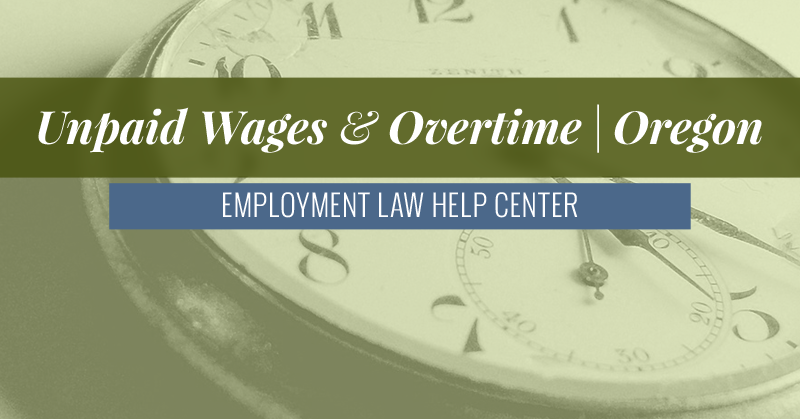Oregon Unpaid Wages and Overtime
Oregon wage and hour laws set strict deadlines for the payment of regular and overtime wages to employees throughout the state, as well as for the payment of final wages in instances where the employment relationship is terminated, either because the employee quits or is fired, or because the company goes out of business. If you have a valid unpaid wages claim against your employer in Oregon, you may be able to recover the wages you are owed by filing a complaint with the Wage and Hour Division of the Bureau of Labor and Industries (BOLI). However, collection of unpaid wages depends on the employer’s financial ability to pay, bankruptcy filing, and other factors, and if BOLI is unable to recover the wages you are owed, you may choose to file a lawsuit in court. Contact a knowledgeable Oregon unpaid wages attorney today to discuss your legal options.

Oregon Overtime Requirements
In Oregon, nonexempt employees who work more than 40 hours in a given workweek are entitled to an overtime rate of one-and-one-half times their regular rate of pay for every hour worked over 40, and employees of manufacturing establishments are also entitled to premium pay after working 10 hours a day. Special overtime rules also apply to canneries, government agencies and some hospital employees in Oregon. Not all types of employees are entitled to overtime wages however, and if you fall into one of the following categories, you are considered “exempt” from the federal overtime law, which means you are not entitled to overtime pay:
- Independent contractors
- Volunteers
- Outside salespeople
- Certain computer specialists
- Executive, administrative and professional employees who earn a salary
- Employees of seasonal amusement or recreational businesses
- Seamen
- Newspaper deliverers
- Employees of certain small newspapers
- Criminal investigators
- Employees who work on small farms
- Certain switchboard operators
- Workers engaged in fishing operations
- Casual domestic babysitters

Unpaid Wage Claims in Oregon
Oregon wage and hour laws require an employer to pay employees the regular or overtime wages they are owed in a timely manner, and any employee who has not been paid wages for hours worked or overtime wages for hours worked over 40 in a given workweek can file an unpaid wages claim with the Wage and Hour Division of the Bureau of Labor and Industries (BOLI). Additionally, there are time deadlines in Oregon for the payment of final wages when the employment relationship ends, and if an employer has gone out of business or has otherwise terminated the employment relationship, and the employee has not received his final paycheck, he may have a claim for unpaid wages. In general, an unpaid wage claim in Oregon may arise from any of the following situations:
- The employer made unlawful deductions from an employee’s paycheck
- The employer failed to pay all minimum wages
- The employer failed to pay all overtime wages
- The employer provided the final paycheck after the time due
- The employer failed to pay the employee for all hours worked
Contact an Experienced Unpaid Wages Attorney in Oregon
Even though Oregon has strict laws governing the payment of wages for regular and overtime hours worked, some employers choose not to follow these laws. If an employer in Oregon willfully fails to pay all wages due to an employee in a timely manner, the employee may have grounds to file a wage claim lawsuit against the employer, in order to pursue compensation for unpaid wages and, in some cases, additional penalty wages as well. If you believe you may be entitled to financial compensation for unpaid wages in Oregon, either because your employer paid you less than minimum wage, or because he made unlawful deductions from your paycheck, consult an experienced Oregon wage and hour lawyer today for legal help. With a skilled attorney on your side, you can significantly improve your chances of recovering the wages you are owed.




